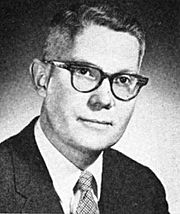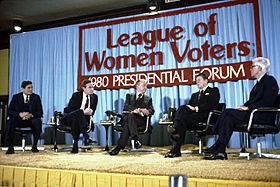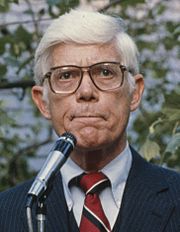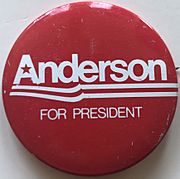John B. Anderson facts for kids
Quick facts for kids
John B. Anderson
|
|
|---|---|
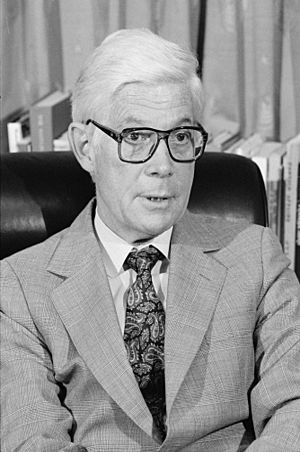
Anderson in 1980
|
|
| Chair of the House Republican Conference | |
| In office January 3, 1969 – June 8, 1979 |
|
| Leader | Gerald Ford (1969–1973) John Jacob Rhodes (1973–1979) |
| Preceded by | Melvin Laird |
| Succeeded by | Samuel L. Devine |
| Member of the U.S. House of Representatives from Illinois's 16th district |
|
| In office January 3, 1961 – January 3, 1981 |
|
| Preceded by | Leo E. Allen |
| Succeeded by | Lynn Morley Martin |
| Personal details | |
| Born |
John Bayard Anderson
February 15, 1922 Rockford, Illinois, U.S. |
| Died | December 3, 2017 (aged 95) Washington, D.C., U.S. |
| Resting place | Arlington National Cemetery |
| Political party | Independent (from 1980) Republican (until 1980) |
| Spouse |
Keke Machakos
(m. 1953) |
| Children | 5 |
| Education | University of Illinois at Urbana–Champaign (BA, JD) Harvard University (LLM) |
| Military service | |
| Allegiance | |
| Branch/service | |
| Years of service | 1943–1945 |
| Rank | |
| Battles/wars | World War II |
John Bayard Anderson (February 15, 1922 – December 3, 2017) was an American lawyer and politician. He served in the United States House of Representatives for Illinois from 1961 to 1981. He was a member of the Republican Party. From 1969 to 1979, he led the House Republican Conference. In 1980, he ran for president as an independent candidate. He received 6.6% of the votes.
Anderson was born in Rockford, Illinois. He became a lawyer after serving in the Army during World War II. He also worked for the United States Foreign Service. Later, he became the State's Attorney for Winnebago County, Illinois. In 1960, he was elected to the House of Representatives. At first, he was very conservative. But his views changed during the 1960s, especially on social issues.
He became the leader of the House Republican Conference in 1969. He stayed in that role until 1979. He spoke out against the Vietnam War. He also criticized President Richard Nixon during the Watergate scandal. In 1980, Anderson ran for president as a Republican. He suggested raising the gas tax and lowering social security taxes.
He did well in the early primary elections. But he later left the Republican race to run as an independent. In the election, he finished third. Ronald Reagan won, and Jimmy Carter was second. Anderson gained support from people who were unhappy with Carter. He also got support from independent voters and college students. After the election, he went back to being a lawyer. He helped start FairVote, a group that works for electoral reform. He also won a court case, Anderson v. Celebrezze, which made it easier for independent candidates to run. Anderson taught at many universities. He also supported Ralph Nader in 2000. In 2012, he helped create the Justice Party.
Contents
Early Life and Education
John Bayard Anderson was born in Rockford, Illinois. He grew up there, helping in his family's grocery store. His father was from Sweden, as were his mother's parents. In 1939, he graduated at the top of his class from Rockford Central High School.
He went to the University of Illinois at Urbana–Champaign and finished in 1942. He started law school, but World War II interrupted his studies. In 1943, he joined the Army. He served as a staff sergeant in France and Germany until the war ended in 1945. He received four service stars for his time in the war.
After the war, Anderson returned to school. He earned a Juris Doctor (J.D.) degree in 1946 from the University of Illinois College of Law. A J.D. is a law degree that allows someone to practice law.
Starting His Law Career
Anderson became a lawyer in Illinois in 1946. He practiced law in Rockford. He then went to Harvard Law School and earned a Master of Laws (LL.M.) degree in 1949. An LL.M. is an advanced law degree. While at Harvard, he also taught at Northeastern University School of Law.
He returned to Rockford briefly to practice law again. Then, Anderson joined the United States Foreign Service. This is a group of people who work for the U.S. government in other countries. From 1952 to 1955, he worked in Berlin, Germany. He advised the U.S. High Commissioner for Germany on economic matters. After this, he returned to practicing law in Rockford.
Early Political Career
After returning to Rockford, Anderson was asked to run for public office. In 1956, he was elected State's Attorney for Winnebago County, Illinois. A State's Attorney is a lawyer who represents the government in court cases. He won a four-person primary election and then the general election.
After one term, he decided to leave that job. The local congressman, Leo E. Allen, who had served for 28 years, announced his retirement. Anderson decided to run for Allen's seat in the United States House of Representatives. This district was very Republican. He won the Republican primary election and then the general election. He served in the House of Representatives for ten terms, from 1961 to 1981.
Changing Views in Congress
When he first started, Anderson was one of the most conservative Republicans in the House. He even tried to pass a constitutional amendment three times to recognize "the law and authority of Jesus Christ" over the U.S. These ideas did not pass.
However, Anderson voted for important civil rights laws. These included the Civil Rights Act of 1964 and the Civil Rights Act of 1968. He also supported the 24th Amendment and the Voting Rights Act of 1965. These laws helped protect the rights of all Americans.
As the 1960s went on, Anderson began to change his mind on some social issues. He became more liberal on these topics. But he remained conservative on money matters. His fellow members of the House respected him. In 1964, he joined the powerful Rules Committee.
In 1969, he became the Chairman of the House Republican Conference. This was the third-highest position for Republicans in the House. Even with this high rank, he often disagreed with other conservatives. He strongly criticized the Vietnam War. He also spoke out against President Richard Nixon during the Watergate scandal. In 1974, he won his election with 55% of the vote, which was his lowest percentage.
Anderson's position as chairman was challenged three times. After Gerald Ford lost the 1976 presidential election, Anderson lost a key supporter. In 1977, a religious TV minister named Don Lyon challenged Anderson in the Republican primary. It was a tough campaign. Lyon raised a lot of money and had strong support from conservatives. But Anderson won the primary by 16% of the votes. He was helped by newspaper endorsements and support from independent and Democratic voters.
1980 Presidential Campaign
Early Steps and Ideas
In 1978, John Anderson started looking into running for president. Not many people or news outlets were interested at first. In April 1979, he decided to join the Republican primary. Other candidates included Ronald Reagan and George H. W. Bush.
Near the end of 1979, Anderson introduced his main campaign idea. He suggested adding a 50-cent tax on each gallon of gasoline. To balance this, he wanted to cut social security taxes by 50%. He focused his campaign efforts on four states: New Hampshire, Massachusetts, Illinois, and Wisconsin. He gained some support from Republicans. News reporters and experts liked him because he spoke clearly and had moderate views. He refused to follow the conservative path that other Republicans were taking.
Anderson often called his campaign "a campaign of ideas." He supported tax credits for businesses that did research and development. He believed this would make American businesses more productive. He also wanted to increase funding for research at universities. He supported protecting the environment.
He disagreed with Ronald Reagan's plan to cut taxes broadly. Anderson worried this would increase the national debt and lead to more inflation (when prices go up). He also supported a tax on gasoline to reduce America's reliance on foreign oil. He supported the Equal Rights Amendment and gay rights. He also pointed out his perfect record of supporting all civil rights laws since 1960. He was against requiring people to register for the military draft. This made him popular with many liberal college students who were unhappy with President Carter. However, he also supported a strong military and NATO. These were positions often linked with Republicans. He also supported reducing government rules for some industries and balancing the budget by cutting government spending.
Republican Primary Results
On January 5, 1980, during a Republican debate in Des Moines, Iowa, Anderson said that lowering taxes, increasing defense spending, and balancing the budget all at once was impossible. He spoke about his father's immigration to the U.S. and said Americans needed to make sacrifices for a better future. For the next week, Anderson was widely featured in the news. He spent less than $2,000 in Iowa but finished with 4.3% of the vote. News channels showed him as a man of good character. In New Hampshire, Anderson again did better than expected, finishing fourth with almost 10% of the vote.
The Associated Press first said Anderson won in Massachusetts and Vermont. But he narrowly lost both primaries. In Massachusetts, he lost to George Bush by a very small amount (0.3%). In Vermont, he lost to Reagan by 690 votes. Anderson then went to Illinois, where he had a lead in the polls. But his campaign there struggled. Reagan defeated him, 48% to 37%. Anderson won in Chicago and Rockford, the state's largest cities. But he lost in the more conservative southern part of the state. The next week, he finished third in Connecticut with 22% of the vote. Then came Wisconsin, which was thought to be his best chance to win. But he finished third again, with 27% of the vote.
Running as an Independent
The Republican Party's platform did not support the Equal Rights Amendment. Anderson strongly supported it. Polls showed that Anderson was much more popular with all voters across the country than he was with just Republican primary voters. Without even campaigning, he was polling at 22% nationally in a three-way race.
Anderson decided to run as an independent candidate. This was very difficult. He had to get on the ballot in all 51 states (major parties automatically appear). He had to raise money for his campaign. Major parties received millions of dollars in government funding. He also had to get national news coverage and find a suitable running mate. He built a new campaign team, got on every ballot, and raised a lot of money. His support in polls went as high as 26%.
In the summer of 1980, he took a trip overseas to show his foreign policy knowledge. But this trip was not well-received on national television. The major parties, especially the Republicans, got a lot of attention during their national conventions. Anderson was left out of the news. He also made an appearance with Ted Kennedy, which was seen as a mistake. By mid-August, his poll numbers dropped to 13–15%.
A key goal for Anderson was to appear in the fall presidential debates. The League of Women Voters invited him because of public interest, even though he was only polling at 12%. In late August, he chose Patrick Lucey as his running mate. Lucey was a former Democratic Governor of Wisconsin. Also in late August, Anderson released a detailed 317-page plan for his campaign, under the name of the National Unity Party. This plan was well-received. In early September, a court ruling helped Anderson qualify for public funding after the election. He also submitted his petitions to get on his 51st ballot. Then, the League of Women Voters announced he had met the requirements and would be in the debates.
The Fall Campaign
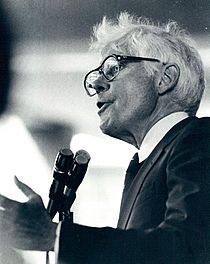
President Carter said he would not debate with Anderson. Carter skipped the debate, which hurt his image with voters. Reagan and Anderson had a debate in Baltimore on September 21, 1980. Anderson did well, and polls showed he won a small victory over Reagan. However, Reagan, who had been called a warmonger by Carter, appeared reasonable in the debate. This debate was Anderson's big chance for a major breakthrough. But he only got a modest win.
In the following weeks, Anderson's support slowly dropped from 16% to 10–12%. By the end of October, Reagan debated Carter alone. CNN tried to include Anderson in the second debate by using a tape delay. They asked Anderson the same questions asked of Carter and Reagan, and then showed Anderson's live answers mixed with the tape-delayed responses from the other two.
Anderson's support continued to drop to 5%. But it rose to 8% just before election day. Reagan won the election by a large margin. Many people who might have voted for Anderson ended up voting for Carter or Reagan. In the end, Anderson received 6.6% of the votes. Most of his support came from liberal Republicans who did not like Reagan's conservative views. Many famous thinkers and artists also supported Anderson. These included All in the Family creator Norman Lear and actor Paul Newman.
The Carter campaign worried that Anderson could take away votes from them. But Anderson's campaign ended up being "just another option" for voters who were already unhappy with Carter. Polls showed that about 37% of Anderson voters would have chosen Reagan as their second choice over Carter. Anderson did not win any voting areas in the country.
Anderson's 6.6% was the best result for a third-party candidate since George Wallace in 1968. He later won a lawsuit against Ohio, Anderson v. Celebrezze, which made it easier for independent candidates to get on the ballot. Because he found it hard to succeed as an independent, he later became a supporter of instant-runoff voting. He helped create FairVote in 1992.
Later Career
After the campaign, many college students supported Anderson. He used this support by becoming a visiting professor at several universities. These included Stanford University, Duke University, and the University of Illinois College of Law. In 1984, Anderson supported Walter Mondale over Ronald Reagan in the presidential election.
He led FairVote from 1996 to 2008 and stayed on its board until 2014. He also served as president of the World Federalist Association. He was on the advisory boards of Public Campaign and the Electronic Privacy Information Center. He also worked as a lawyer for the firm Greenberg & Lieberman, LLC.
He was the first executive director of the Council for the National Interest, started in 1989. In the 2000 U.S. presidential election, he was briefly considered for the Reform Party nomination. But he instead supported Ralph Nader, who was nominated by the Green Party. In 2008, Anderson strongly supported Barack Obama for president. In 2012, he helped create the Justice Party. This party supported Rocky Anderson (no relation) for president in 2012. On August 6, 2014, he supported the campaign for a United Nations Parliamentary Assembly (UNPA).
Death
John Anderson passed away in Washington, D.C., on December 3, 2017. He was 95 years old. He was buried at Arlington National Cemetery on June 22, 2018.
See also
 In Spanish: John B. Anderson para niños
In Spanish: John B. Anderson para niños
 | Jackie Robinson |
 | Jack Johnson |
 | Althea Gibson |
 | Arthur Ashe |
 | Muhammad Ali |


